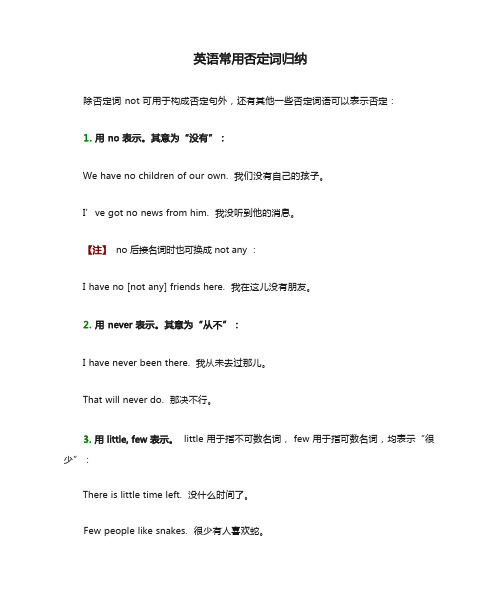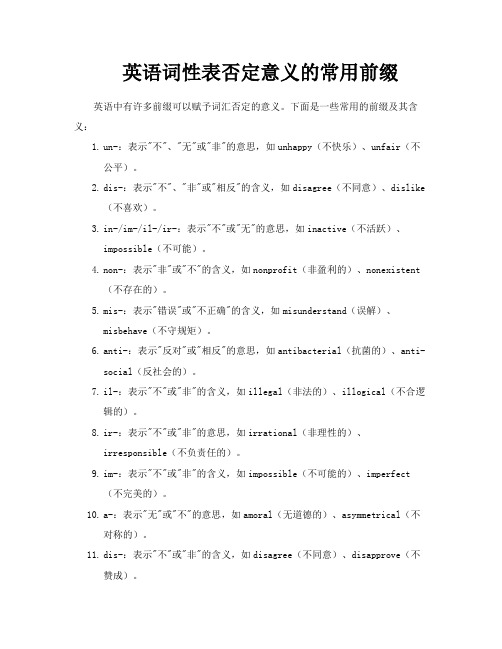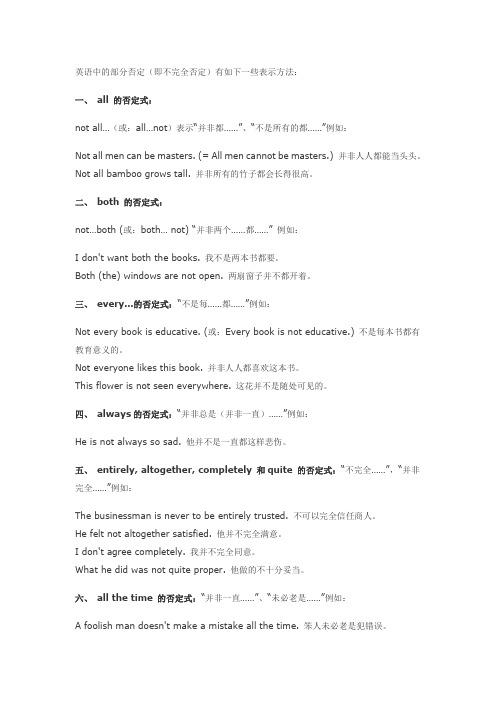英语中的否定
英语常用否定词归纳

除否定词 not 可用于构成否定句外,还有其他一些否定词语可以表示否定:We have no children of our own. 我们没有自己的孩子。
I’ve got no news from him. 我没听到他的消息。
no 后接名词时也可换成 not any :I have no [not any] friends here. 我在这儿没有朋友。
I have never been there. 我从未去过那儿。
That will never do. 那决不行。
little 用于指不可数名词, few 用于指可数名词,均表示“很少”:There is little time left. 没什么时间了。
Few people like snakes. 很少有人喜欢蛇。
若在其前用不定冠词,则表示肯定意义:There is a little time left. 还有点点时间。
A few people like snakes. 有少数人喜欢蛇。
nobody 和 no one 用于指人,其意为“没有人”; nothing 用于指物,其意为“没有任何东西”:No one [Nobody] wants to go there. 没有人想去那儿。
She said nothing. 她什么也没说。
意为“没有人或物”:None of the pupils knew the answer. 学生中谁都不知道答案。
None of this milk can be used. 这牛奶一点都不能用了。
意为“两者都不”:I like neither of the books. 这两本书我都不喜欢。
Neither of us enjoy getting up early. 我们俩谁也不喜欢早起。
意为“很少”:The children are seldom ill. 这些孩子很少生病。
It seldom snows here. 这儿很少下雪。
英语单词否定前缀规律

英语单词否定前缀规律
在英语中,有许多否定前缀可以通过在词根或词干前添加来构成. 以下是几个常见的否定前缀以及它们的意义:
1. "un-":表示否定、相反或逆转的意思。
例如:happy(快乐)→unhappy (不快乐)、able(能力)→unable(不能)。
2. "dis-":表示分开、除去或反对的意思。
例如:like(喜欢)→dislike(不喜欢)、agree(同意)→disagree(不同意)。
3. "im-" 或"in-":表示否定、不适当或逆转的意思。
例如:possible(可能)→impossible(不可能)、human(人类的)→inhuman(非人类的)。
4. "non-":表示不、非或缺乏的意思。
例如:existent(存在的)→nonexistent (不存在的)、stop(停止)→nonstop(不停的)。
5. "mis-":表示错误、不正确或错误的意思。
例如:understand(理解)→misunderstand(误解)、spell(拼写)→misspell(拼写错误)。
这些是一些常用的否定前缀,可以帮助构成否定或相反意义的词汇。
然而,并非所有词根或词干都可以与这些前缀搭配使用,有时候还需要注意词根或词干的变
化。
英语词性表否定意义的常用前缀

英语词性表否定意义的常用前缀英语中有许多前缀可以赋予词汇否定的意义。
下面是一些常用的前缀及其含义:1.un-:表示"不"、"无"或"非"的意思,如unhappy(不快乐)、unfair(不公平)。
2.dis-:表示"不"、"非"或"相反"的含义,如disagree(不同意)、dislike(不喜欢)。
3.in-/im-/il-/ir-:表示"不"或"无"的意思,如inactive(不活跃)、impossible(不可能)。
4.non-:表示"非"或"不"的含义,如nonprofit(非盈利的)、nonexistent(不存在的)。
5.mis-:表示"错误"或"不正确"的含义,如misunderstand(误解)、misbehave(不守规矩)。
6.anti-:表示"反对"或"相反"的意思,如antibacterial(抗菌的)、anti-social(反社会的)。
7.il-:表示"不"或"非"的含义,如illegal(非法的)、illogical(不合逻辑的)。
8.ir-:表示"不"或"非"的意思,如irrational(非理性的)、irresponsible(不负责任的)。
9.im-:表示"不"或"非"的含义,如impossible(不可能的)、imperfect(不完美的)。
10.a-:表示"无"或"不"的意思,如amoral(无道德的)、asymmetrical(不对称的)。
英语表示否定的前缀

英语中表示否定的前缀1. 前缀ab表示否定use v.使用——abuse v.滥用normal adj.正常——abnormal adj.不正常的present adj.——absent adj.缺席abandon v.放弃(abandon oneself to do sth放弃做某事)abolish v.废除2. 前缀mis表示否定misunderstand v.误解、误会mistake n.误会(make a mistake 犯错误)mislead v.误导misjudge v.误判misfortune n.不幸3. 前缀in表示否定,变体有im/ir/ilA. in用于1大多数此跟前indirect adj.间接的incorrect adj.不正确indifferent adj.漠不关心的infinite adj.无限的B. Im用于b/m/p开头的词根前impossible adj.不可能的imbalanced adj.不平衡的impatient adj.不耐心的immobile adj.固定的C. Ir用于r开头的词根前irresponsible adj.不负责任irregular adj.不规则的D. il用于l开头的词根前illegal adj.不合法的illogical adj.不合逻辑的illiterate adj.不识字的(illiteracy rate 文盲率)4. 前缀dis表示否定disagree v.不同意(disagreement n.不同意)discovery n.出现disappear v.消失(disappearance n.消失)discount n.折扣disorder n.混乱disease n.疾病disadvantage n.缺点5. 前缀de表示否定decrease v.减少——increase v.增加devaluate v.贬值deline v.衰退deforest 砍伐degenerate v.退化。
英语中部分否定的几种表示方法

英语中的部分否定(即不完全否定)有如下一些表示方法:一、all 的否定式:not all…(或:all…not)表示“并非都……”、“不是所有的都……”例如:Not all men can be masters. (= All men cannot be masters.) 并非人人都能当头头。
Not all bamboo grows tall. 并非所有的竹子都会长得很高。
二、both 的否定式:not…both (或:both… not) “并非两个……都……” 例如:I don't want both the books. 我不是两本书都要。
Both (the) windows are not open. 两扇窗子并不都开着。
三、every…的否定式:“不是每……都……”例如:Not every book is educative. (或:Every book is not educative.) 不是每本书都有教育意义的。
Not everyone likes this book. 并非人人都喜欢这本书。
This flower is not seen everywhere. 这花并不是随处可见的。
四、always的否定式:“并非总是(并非一直)……”例如:He is not always so sad. 他并不是一直都这样悲伤。
五、entirely, altogether, completely 和quite 的否定式:“不完全……”,“并非完全……”例如:The businessman is never to be entirely trusted. 不可以完全信任商人。
He felt not altogether satisfied. 他并不完全满意。
I don't agree completely. 我并不完全同意。
What he did was not quite proper. 他做的不十分妥当。
英语中部分否定的几种表达方法

much trouble.
5
我并不总是伤心,尽管我碰到了这么多的麻烦。
大家好
1
英语中部分否定的几种表达方法
2
英语中部分否定的几种表达方法
英语中的部分否定(即不完全否定)有如下一些表示方法:
一. all 的否定式: not all… (或all … not) 表示“并非都…”, “不是所有的……”
1. Not all men can be masters. = All men cannot be masters. 并非人人都能当头头。
1.All of them can do it. ------ None of them can do it.
8
“不完全 ……”, “并非完全 ……”
1. Women are never to be entirely trusted ---- especially those 2. who are beautiful.
女人不可以完全信任,尤其是漂亮的。 2. He was not altogether satisfied.
3
4. Not all bamboo grows tall. 并非所有的竹子都会长得很高。
二.both 的否定式: not … both… (或 both … not…) 表示“并非两个都 ….”
1.I don’t want both the books. 我不是两本书都要。
2.I don’t know both of them . 他们两我并不都认识。
英语中的部分否定(即不完全否定)
恒星英语学习网英语中的部分否定(即不完全否定)有如下一些表示方法:英语中部分否定的几种表示方法一、all 的否定式:not all…(或:all…not)表示"并非都……"、"不是所有的都……"例如:Not all men can be masters. (= All men cannot be masters.) 并非人人都能当头头。
Not all bamboo grows tall. 并非所有的竹子都会长得很高。
二、both 的否定式:not…both (或:both…not) "并非两个……都……" 例如:I don't want both the books. 我不是两本书都要。
Both (the) windows are not open. 两扇窗子并不都开着。
三、every…的否定式:"不是每……都……" 例如:Not every book is educative. (或:Every book is not educative.) 不是每本书都有教育意义的。
Not everyone likes this book. 并非人人都喜欢这本书。
This flower is not seen everywhere. 这花并不是随处可见的。
四、always的否定式:"并非总是(并非一直)……" 例如:He is not always so sad. 他并不是一直都这样悲伤。
五、entirely, altogether, completely 和quite 的否定式:"不完全……","并非完全……" 例如:The businessman is never to be entirely trusted. 不可以完全信任商人。
He felt not altogether satisfied. 他并不完全满意。
10个否定句英语
10个否定句英语正确使用否定句在英语学习中是很重要的,它能够使你的英语更加流利,也更加地道。
在本文中,我们将讨论英语中最常见的10个否定句,并讨论它们的用法。
首先,No最常用的否定句,用来表达拒绝或不赞成某人以及反对任何主题。
例如:No, I don want any more tea.(不,我不想再喝茶了。
)当某人表达想法,你可以使用No来表达你不同意的想法。
其次,Never一个重要的否定句,它表达的是永远的否定,意思是从来不。
例如:I never forget your kindness.(我永远不会忘记你的慷慨。
)Never也可以用来描述某种情况或状况永远不会发生。
第三,Nothing一个常用的否定句,它表达的意思是没有任何东西。
例如:I have nothing to say.(我没什么可说。
)Nothing也可以用来表达没有发生任何事情或状态。
第四,Nobody另一个常见的否定句,它表达的意思是没有人。
例如:Nobody can help me.(没有人能帮助我。
)Nobody也可以用来表达没有人可以做某件事。
第五,Nowhere一个常用的否定句,它表达的意思是没有地方。
例如:I can find him anywhere.(我无处可寻。
)Nowhere也可以用来表达某种事物不存在的地方。
第六,Hardly另一个常见的否定句,它表达的意思是几乎不。
例如:I can hardly believe it.我几乎不敢相信。
)Hardly也可以表达某种事情几乎不可能发生或不太可能发生。
第七,Nothing but一个常见的否定句,它表达的意思是除了其他一切,只有一件事发生。
例如:She has nothing but good intentions.(她只有善意的想法。
)Nothing but也可以用来表达仅有一件事情或一种情感发生。
第八,At no time另一个常见的否定句,它表达的意思是某件事永远不会发生。
英语否定结构详解
英语否定结构详解英语否定结构详解Each language has its own affirmative and negative forms .The way to express affirmation and negation is different in different languages.The negative structures of English can be divided into 10 categories according to the different forms and meanings.We mean to give a minute explanation of the main English negative structures through this article.⼀、Complete Negation1、全部否定结构句式由否定词和肯定形式的谓语动词连⽤构成。
英语中的全否定词包括否定代词和否定副词,主要有:no, none⽆⼈,没有任何⼈;nobody没有⼈,谁也不;nothing没有东西,什么也没有;nowhere 哪⼉也不,没有任何地⽅;nohow绝不,毫不;neither 两者皆不,两者中谁都不;never 永不,从未。
例如:None of these things are yours.Neither of us is right.Nothing can stop them from achieving their goal.I could find my notebook nowhere.No country suffered so much as English.2、表⽰全部否定意义的结构还有另外⼀种表⽰法,即:否定式谓语跟不定代词或不定副词连⽤。
如:We do not like any of them.I haven't received any letters today.Anyhow we will not go there today.I didn't see anyone there today .She doesn't like either of the pencile-box.We can't separate teaching from practice in any way.3、概括词和带有否定词缀的词连⽤也可以构成全部否定式。
英语否定句的基本类型
英语否定句的基本类型1 英语否定句英语否定句是表示否定意思的句子,一般包括两无类型:完全否定句和部分否定句。
1.1 完全否定句完全否定句,又称一般否定句,是表示某种事物与客观事实并不符合,需加not、never、nobody、nothing等词语表达的句子,如:I do not like it.(我不喜欢它。
)完全否定句在结构上,一般可用以下三种结构::(1). 助动词/情态动词+not+主要动词:如He will not sing.(他不会唱歌。
)(2). 助动词/情态动词+ not be +形容词/名词:如This is nota mistake.(这不是一个错误。
)(3). 主语+not+动词d/did/done:如He runs did not come.(他没有来。
)1.2 部分否定句又叫做部分加强否定句,是指句子中否定性词语表达的没有到达极点。
常用的词语有barely, hardly, rarely, scarcely, scarcely, hardly ever等,如:I hardly ever watch TV.(我几乎不看电视。
)部分否定句在结构上,也有三种:(1). 助动词/情态动词+hardly / scarcely/ rarely(almost不常用)+动词原形:如He can hardly speak English.(他几乎不会说英语。
)(2). 主语+hardly/scarcely/rarely(almost不常用)+动词过去式:如She rarely visited the park.(她很少去公园。
)(3). 主语+have/has+hardly/scarcely/rarely(almost不常用)+过去分词:如I have hardly taken the exam.(我几乎没参加过考试。
)以上就是英语中完全否定句和部分否定句的基本类型,当然还有很多否定句的表达方式,都是因人而异。
- 1、下载文档前请自行甄别文档内容的完整性,平台不提供额外的编辑、内容补充、找答案等附加服务。
- 2、"仅部分预览"的文档,不可在线预览部分如存在完整性等问题,可反馈申请退款(可完整预览的文档不适用该条件!)。
- 3、如文档侵犯您的权益,请联系客服反馈,我们会尽快为您处理(人工客服工作时间:9:00-18:30)。
英语中的否定第一部分:重点讲解I. 否定的种类:否定句是英语中的常用基本句型之一,它用来表示对所表达情况的否认.英语的否定结构形式多种多样,无论在思路上,还是在表达方式上,都与汉语有许多差异.如果只按字面意思翻译,有时会造成误解.因此,在做英译汉和汉译英练习时,一定要认真体会其中的含义,不要望文生义,以防陷入这个可怕的迷宫.按意义分,英语中的否定多种多样.有全部否定、部分否定、多重否定(双重否定).1)全部否定no, not, never, none, nobody, nothing, nowhere, neither... nor,结构均表示强烈意味的完全否定, 在汉语中体现为"绝对不","没有","远不(非)......","一点也不","根本不......","无论如何也没有......"等.2)部分否定英语中一些含有总括含义的代词、形容词或副词,当用于否定句中时,只否定一部分,而不是完全否定.如all, everybody(everyone), everything, anyone(anybody), anything, anywhere, everywhere, always, quite, both, entirely, altogether等词与not连用时,在汉语中译为"......不全是......","不都是......","并非全都是......","不总是......"等,而不是按照字面理解为"所有......都不是".All that glitters is not gold.闪闪发光的东西不一定都是金子.(误:所有闪闪发光的都不是金子.)All of us don’t want to go.照字面看来好像是“我们大家都不想去”,而实际上是“并非大家都不想去”,即有人想去,有人不想去。
“None of us wants to go”才是“大家都不想去”因此,“All……not……”应解释为“一切……并不都……”或“并非一切……都……”。
例如:All knowledge and techniques of modern medicine cannot bring him back to life.即使现代医学的全部知识与技术也不能使他起死回生。
(注:在此解作“即使全部的……也不……”)类似“All……not……”的结构还有“Both……not……”, “Every……not……” ,如:Every instrument here is not good.这里的仪器并不都很好。
二:英语否定形式1)英语中否定含义的表达形式多种多样,可以用not,no,never,none,nobody,nothing,nowhere等否定词来表达否定之意.2)可以用hardly,scarcely,seldom,little,few等半否定词来表达否定之意.3)可以用含否定意义的前缀a-,ab-,an -,de-,dis-,il-,im-,in-,ir -,non-,un-,under-等构成的词表达否定之意;也可以用后缀-less,-free,-proof等构成的词表达否定之意。
4)除此以外,还可以用含否定意义的词、词组或句子表达否定意义,现将其作如下归纳:一)、运用含否定意义的词及词组表示否定意义1.动词:absent(缺席,不到),fail(没有),defy(公然反抗),deny(否认),miss (未击中,未赶上),lack(缺乏),escape (被……忘掉),ignore(不顾),refuse(不肯,拒不),negate(否定),decline(拒绝),neglect(忽略),forbid(不许,不准),resist(抗拒)等。
例如:He absented himself from a meeting on some pretext.他借故不去开会。
Her name escaped me for a moment.我一时记不起她的名字了。
2.动词短语:differ from(与……不同),prefer… to(宁愿……而不),keep off(不接近,不让……接近),keep…from/prevent…from/stop…from/protect…from(阻止,使……不),deprive… of(使丧失),lose sight of(看不见),make lightof(轻视,视……不足道)等。
例如:Why should you prevent them from moving into the new house?你们为什么不让他们搬进新居呢?Sickness deprived her of the pleasure of meeting her son.疾病使她不能同儿子欢聚。
3.名词:absence(不在),failure(没有,不及格),lack(缺乏),(不愿),refusal (不肯),ignorance(无知),negation(否定),shortage(缺乏,不足),want(缺少),zero(乌有)等。
例如:His reluctance to think of a nonsports career caught up with him.他不愿考虑运动员以外的职业给他带来的不幸。
Bass was also in ignorance of his whereabouts.贝斯也不知他的下落。
Shortage of manpower is the chief cause of the delay at the factory.人力不足是该工厂生产停滞的主要原因。
Their hopes were reduced to zero.他们的希望化为乌有。
4.形容词及形容词短语:reluctant(不愿),absent from(不在,没到场),ignorant of (不知,不懂),different from(与……不同),short of(缺少,不足),far from(远非,决不),safe from(免于),free from (不受……影响的,没有……的),free of (无……的)等。
例如:We should be free from arrogance and rashness.我们应该不骄不躁。
5.介词:above(超出……之外),against (反对),beneath(不值得),beyond(超出,无法……),off(离开),past(超过),but/except(除……之外)等。
例如:This problem is beneath notice.这个问题不值得注意。
The young men of the present day are beyond my comprehension.当代青年我无法理解。
His stupidity is past all belief.他的愚蠢简直不可思议。
6.介词短语:at a loss(不知所措,不知……),in the dark(不知道),invain (徒劳,无用),out of the question(不可能),off one's guard(毫无防备,没有警惕),out of the swim(不合时髦,不合潮流),at one's wits'end(智穷计尽,不知所措),at the end of one's rope/at the end of one's row(山穷水尽,智穷力竭)等。
例如:The police are at a loss for an explanation of the affair.警察不知如何解释这件事情。
I am completely in the dark concerning his plans.关于他的计划,我全然不知。
I have so much work to do that a holiday for me this year is out of the question.我有这么多工作要做,因此,今年我不可能休假了。
7.其他词组及固定搭配:anything but/by no means/in no case/on no account/under no circumstances(决不),instead of (而不),rather than(而不是),other than(不同于,除……以外),aside from(除了……以外),least ofall(最不),the last (极不可能的,最不适合的),let alone/to say nothing/…still less,…(更不用说)等。
例如:The little bridge is anything but safe.那座小桥决不安全。
The truth is quite other than what you think.事实真相同你想的完全不同。
He can't run a hundred yards,still less a mile.他一百码都跑不了,更不用说一英里了。
二、运用某些结构表达否定意义1.too …to …太…而不能He's too much of a coward to do that.他太怯懦了,干不了那件事。
enough to + v足够…能He is old enough to go to school .He is too young to go to school .too …not …(双重否定)太…而不可能不…He is too brilliant not to be elected .not …enough to + v 不够…而不能She is not old enough to go to school .。
not /never too…to …怎么…也不过分越…越…You can’t be too careful to drive car.but /only too …to …非常…He is but too glad to join us 他非常乐意参加我们的活动。
2.more A than B(与其B不如A)或more than+含有can的从句(不能)He is more brave than wise.他有勇无谋。
